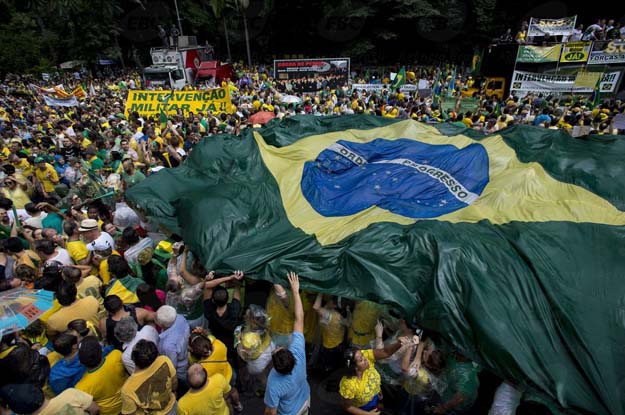In May 2016, the Brazilian Senate impeached President Dilma Rousseff in the middle of her second term, amid economic recession, corruption scandals and street protests. She was replaced by her vice president, Michel Temer. One year later, Brazilians are discussing Temer’s impeachment, amid economic recession, corruption scandals, taped recordings that could incriminate the chief of state, and street protests. What is going on? There’s more at stake than two troubled administrations. Brazil is facing the failure of the political system created in the 30 years since the re-democratization to cope with the modern demands of an open, transparent and accountable government.
The rise and fall of expectations
In the 2000s, Brazil was hailed as a rising power, reducing poverty and inequality and winning the bids to host both the World Cup and the Summer Olympics. Under the charismatic leadership of President Luiz Inácio Lula da Silva, the country was surfing the wave of the global commodity boom and seemed to have found a way to consolidate democracy and economic growth. Lula chose his chief of staff, Dilma Rousseff, to be his successor.
It all changed after the global financial crisis. Under Rousseff, the country failed to adapt to the new economic scenario, using policies that failed to boost growth and increased the public debt. Much less pragmatic than Lula, very centralizing and poor in managing the complex party alliances that Brazilian politics demand, the president led the country into the worst recession in more than 100 years.
Corruption has been a serious problem in Brazil since colonial times. During the Lula administration, there was a major scandal concerning bribes to the president’s allies in Congress. But in the context of strong economic growth, the impacts on the popularity of the chief of state were limited. It was different with Rousseff. A major investigation from the Federal Police and the Federal Public Prosecutors uncovered a huge corruption scheme in Petrobras, the state-led oil company which is the biggest firm in Latin America. Big building companies were bribing politicians and Petrobras’ executives in order to get government contracts.
A tale of two impeachments?
Rousseff was impeached under charges of cooking the financial books of the government to hide the rise in the public debt. It was a technical issue that many Brazilians did not understand. She fell because of her loss of popularity due to the recession and for her failure to curb corruption. Even so, her party still had many supporters who longed for the better years of Lula. Many of them refused to accept her impeachment, calling it a coup d’état, and rejected Temer as a legitimate substitute.
Temer did not have the administrative experience or leadership skills to improve his popularity. As a veteran Congressman, he is more at ease negotiating deals in smoke-filled backrooms than persuading voters to accept complex reforms. Although he was Rousseff’s vice president, his coalition lacks the left-wing parties that governed Brazil since 2003, relying instead on the conservative politicians who were in the opposition. Many of his allies were also implicated in the corruption scandals, including one minister who was caught in tape defending the impeachment as a way “to stop the bleeding” and put an end to the investigations.
The new president’s program, billed as a “bridge to the future,” stands on three pillars: a harsh austerity program, the reform of the pension system and the reform of the labor code. The business community supports these initiatives, but they are unpopular among the population, which fears the loss of Brazil’s social protection net in times of recession and uncertainty.
After one year in government, Temer has achieved little. The economy is still in crisis, with unemployment rising. The anti-corruption investigations are still ongoing three years later, revealing that bribes and crony relationships between politicians and corporations are widespread among all the major parties.
The investigations and the tapes implicate Temer directly in the corruption scandals. The president is now formally under investigation for taking bribes and for obstruction of justice. With a one-digit popularity level at the polls, it is hard to imagine that he can survive this crisis. His statement that he will not resign sent financial markets tumbling.
The lessons of the protests
Since 2013, Brazilians have staged mass demonstrations for and against impeachments, the World Cup, the Olympics, local politicians – the list goes on. The protests happened in a context of growing ideological polarization between left and right. They were also the first ones since the return of democracy that were not led by political parties or trade unions, but were born of new social movements that use the Internet to organize collective action and spread their political messages.
Despite their diversity and plurality of voices, the demonstrations shared some common themes: the rejection of corruption, the demand for more and better public policies in health, education and transportation, and a general criticism of the political system: a popular slogan is “You do not represent me,” yelled at a variety of politicians.
The polarization of the last years is not common in Brazil, and it has left many scars among friends, colleagues and families. It masks the fact that most Brazilians want the same: an open and transparent government able to cope with the big social problems that the country faces.
It is a simple message, but so far Brazil’s moderate leaders have failed to acknowledge the legitimacy of that claim, and to offer solutions. The political class is too busy trying to keep itself out of jail. This is creating an opening for radicals, opportunists and populists – and that is a dangerous path, as a quick look around the world shows these days.
—
Santoro is a political scientist and professor at the State University of Rio de Janeiro.








